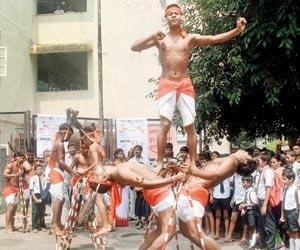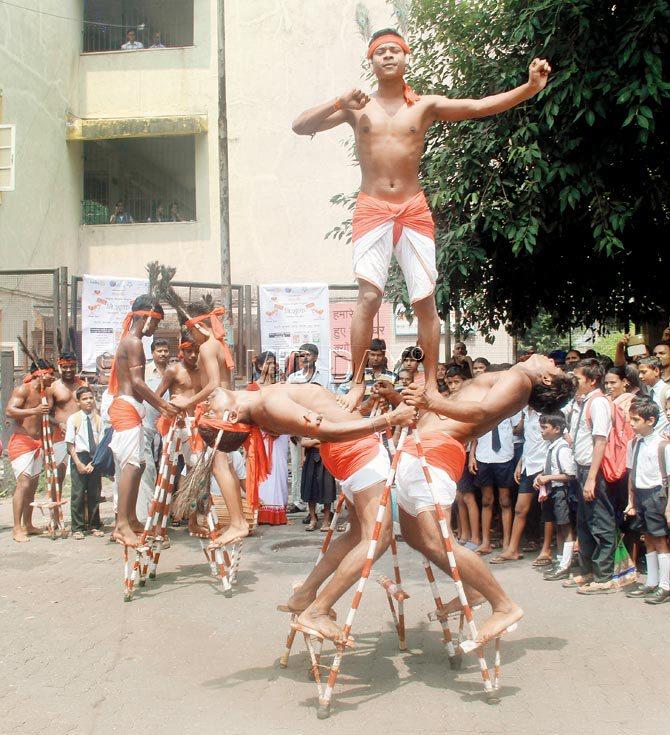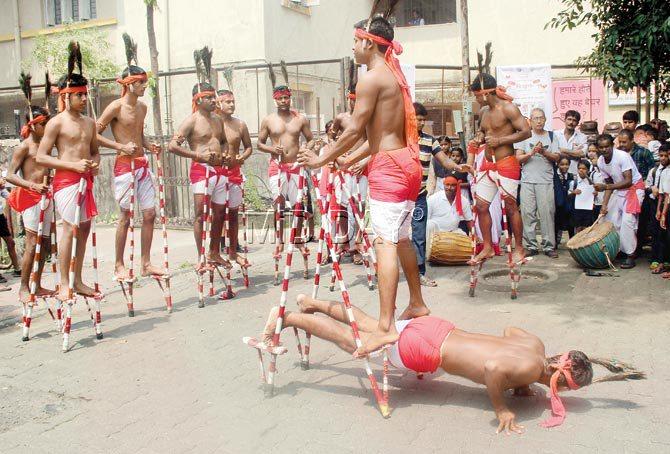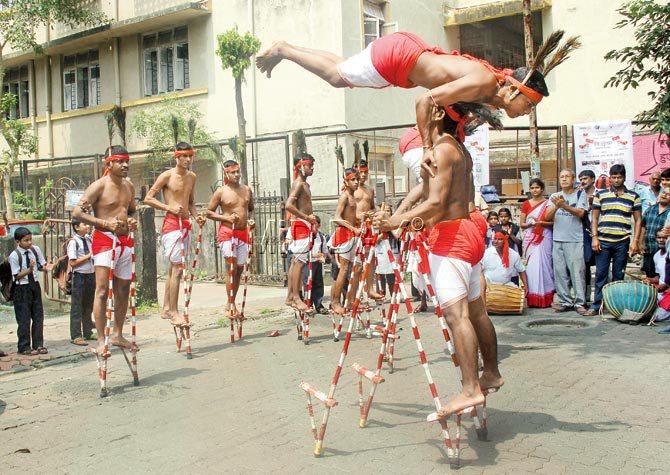An all-male dance troupe from West Bengal arrives Mumbai with bamboo stilts to perform Raibenshe, one of India's oldest martial dance forms

Clad in red and yellow dhotis, wearing brass anklets and a piece of cloth tied around their head, 15 men take the stage. As the accompanying musicians play heavy beats of the dhol (drums) and kanshi (cymbals), the dancers begin their performance. Perched on bamboo sticks, they use them as stilts to walk across the stage. Their moves are acrobatic and vigorous, punctuated by yells and gestures that suggest brandishing of knives, drawing bows from the quiver and galloping on the back of a horse. As the performance progresses, the group splits into pairs to create different formations — some standing on top of each other, others interlacing their arms and legs in a way that one partner hangs mid-air while the other swirls him around.
ADVERTISEMENT

Jargram Brotochari Samiti dance troupe from West Bengal showcases various formations that are part of Raibenshe, in a Vile Parle West bylane. Pics/Tanvi Phondekar
Reviving a martial art
These high-energy moves are part of Raibenshe (royal bamboo), a martial dance form that originated in Bengal 2,500 years ago. "Today, few troupes practise it since it requires rigorous training," says Sitendu Chakraborty, teacher at Jargram Brotochari Samiti, a West Bengal-based group that will arrive in Mumbai for the first time tomorrow to perform Raibenshe at the oldest Durga Puja in the city organised by Bombay Durga Bari Samiti. Traditionally, Raibenshe was performed by the Bagdi community, who worked as lathiyals (private militia) for the feudal lords in medieval Bengal. They were highly skilled in fighting with bamboo sticks. "Historical references suggest that Alexander's army couldn't move forward when he attacked India in 326 BC because of the Raibenshe war tactics. During the colonial rule, Raibenshe soldiers lost their importance because of the shift to European war tactics, and many turned into bandits," informs Chakraborty.

Bengal's pride
He adds that the dance would have been extinct if not for Bengali magistrate Gurusaday Dutta, who founded the Bratachari movement in the 1930s. He adapted the Raibenshe model as a physical training regimen for Bratachari members. Today, the dance is mostly performed in Birbhum, Bardhaman and Murshidabad regions of West Bengal. Established 35 years ago, the Jargram Bratachari Samiti comprises performers from Jargram, a village in the Bardhaman district. "The dance aims to generate courage and bring alive the spirit of joy," says Anjan Bhag, a performer in the troupe, whose youngest member is 12. The team has travelled with the dance to Dhaka and Chittagong.

As part of the 90-minute performance, the dancers will also showcase Dhali, Ranpa and Lathi Khela. While Dhali originated on battlegrounds, where exhausted soldiers would dance with swords after winning a war, Ranpa is focused on the balance of the body on bamboo sticks. Meanwhile, Lathi khela features dancers forming pairs and duelling with bamboo sticks.
ON: September 29, 8.30 pm
AT: Tejpal Auditorium, Gowalia Tank, near August Kranti Maidan, Grant Road.
 Subscribe today by clicking the link and stay updated with the latest news!" Click here!
Subscribe today by clicking the link and stay updated with the latest news!" Click here!






